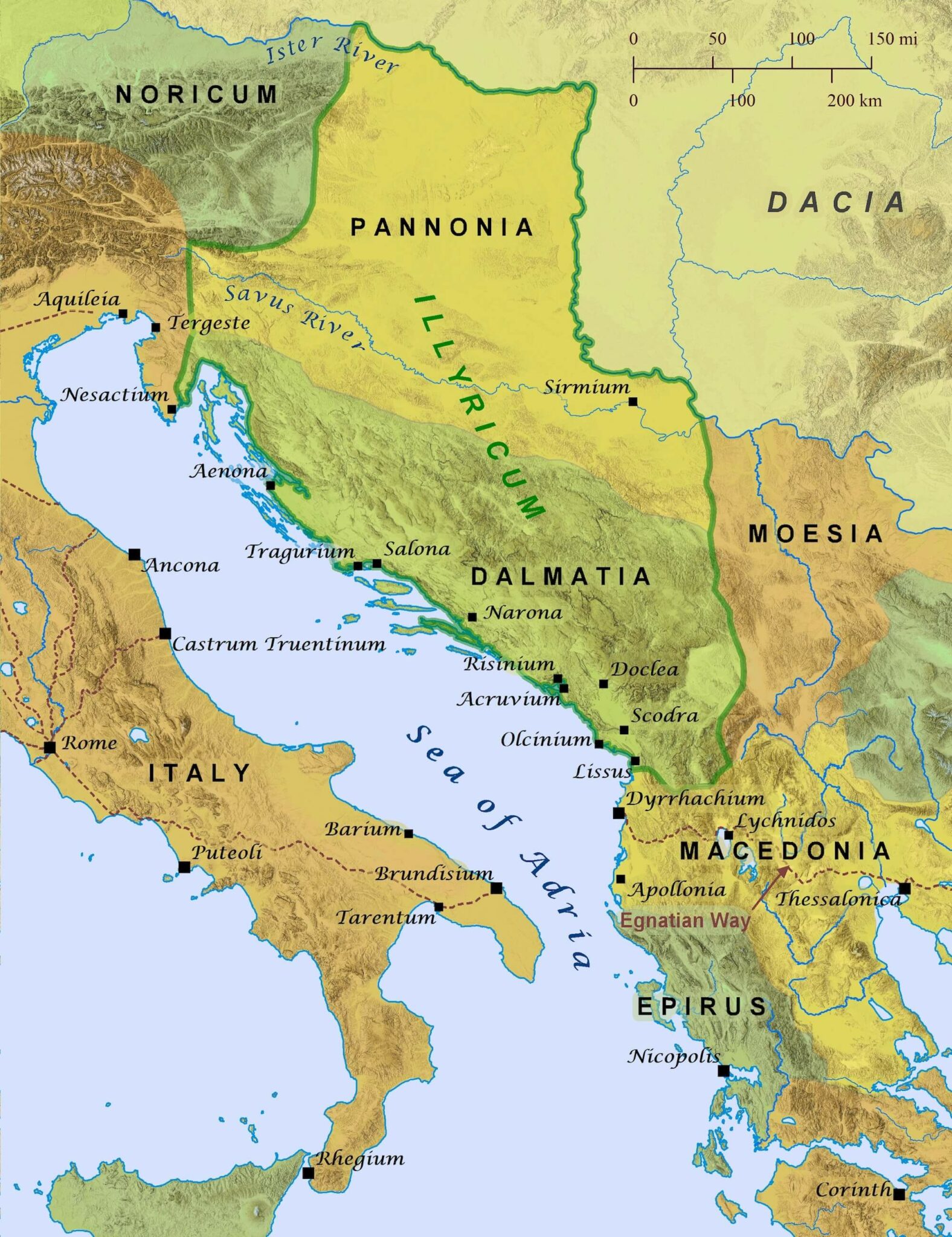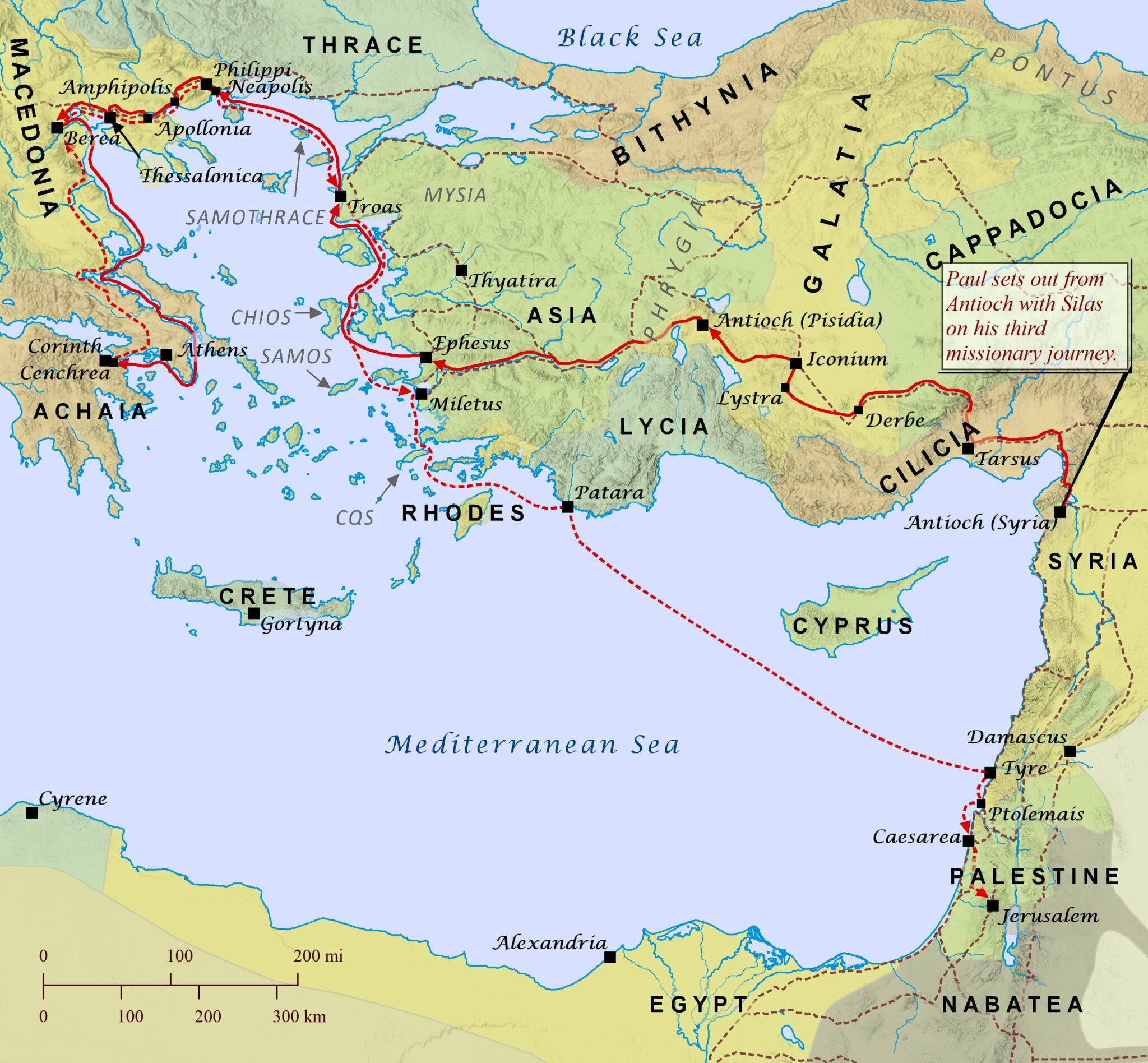Paul is not planning to travel to Spain by way of Rome immediately; first, he will make a trip to Jerusalem to deliver a contribution to the poor believers there. The contribution was voluntary, and yet the Gentiles are indebted to the Jews due to their shared spiritual blessings in Christ.
Paul clarifies that he is not headed to Spain right away; now, I am going to Jerusalem serving the saints. For Macedonia and Achaia have been pleased to make a contribution for the poor among the saints in Jerusalem (vv 25–26).
The churches at Macedonia (where Philippi and Thessalonica were located) and Achaia (where Corinth was located) made a contribution to the poor believers in Jerusalem (See Map). The words have been pleased make it clear that the contribution was voluntary and given joyfully.
This is likely the same offering mentioned by Paul in 2 Corinthians 8 and 9. Paul admonished the Corinthian church to have the offering they had pledged to give to help those suffering persecution in Jerusalem, saying “Achaia has been prepared since last year” to give (2 Corinthians 9:2). This, refers to the prior willingness of the Corinthian church to donate to help Jewish believers suffering persecution.
In 2 Corinthians 8 and 9, Paul admonished the Gentile believers in Corinth to have the money ready when he came. He mentioned that the Philippian church (located in Macedonia) had already given and was the example they should follow. (Acts 18:12 tells us the governor of Achaia ruled Corinth.)
In his admonition to the Corinthians, Paul states the principle that God rewards those who give (2 Corinthians 9:6) but that each person should give as they purpose in their hearts, for “God loves a cheerful giver” (2 Corinthians 9:7).
While Paul’s primary mission was to take the gospel to the Gentiles in places where churches were not yet established, he still valued caring for those who are already believers. He was going to deliver a contribution to the poor among the saints in Jerusalem. Paul believed this errand was what God had called him to next.
Paul repeats that they were pleased to do so (v 27) to emphasize that the gift the churches gave for the saints in Jerusalem was voluntary. However, afterward, he says the Gentile churches are indebted to them (v 27) (the Jewish saints in Jerusalem). This seems backwards. Why would someone giving a gift be indebted to the ones receiving the gift?
As Paul has explained throughout Romans, the Gentiles have been given the spiritual blessings of the Jews through faith in Christ. Gentiles and Jews are saved and share in all of the spiritual blessings, but those blessings came through the Jews. Through faith, Gentiles believers are grafted in to the spiritual heritage of Israel (Romans 11:17). The great blessing of the scriptures also came through the Jews (Romans 3:1-2).
This letter has mentioned many times the concept of salvation coming to the Gentiles by way of the Jews. In Romans 11, Paul uses the image of a branch being grafted into a tree as a picture of the Gentiles taking part in the blessings of God through the Jews (Romans 11:17).
Paul frames the financial offering of Gentiles to relieve believing Jews suffering for their faith as follows: For if the Gentiles have shared in their spiritual things, they are indebted to minister to them also in material things (v 27).
Because Gentiles share in the spiritual blessing of the Jews, they ought to share their material blessings with Jewish believers in need.
Paul did embark on his trip, beginning in Jerusalem, as he intended (v 26). When Paul reached Jerusalem, he was almost immediately arrested, and ended up going to Rome under arrest, after he appealed to Caesar. He exercised his right as a Roman citizen to appeal to Caesar because he could not get a fair trial in Israel (Acts 25–28).
What actually transpired is that Paul would not only visit Rome, but that he would spend his last days there, being martyred under the reign of Nero. When Paul writes to Timothy from his Roman prison, he knows his time to die is near (2 Timothy 4:6–8).
Biblical Text
25 but now, I am going to Jerusalem serving the saints. 26 For Macedonia and Achaia have been pleased to make a contribution for the poor among the saints in Jerusalem. 27 Yes, they were pleased to do so, and they are indebted to them. For if the Gentiles have shared in their spiritual things, they are indebted to minister to them also in material things.
Check out our other commentaries:
-
Romans 3:1 meaning
If God cares about faith and not works or heritage, what advantage do the Jewish people have? And if God cares about the heart of...... -
Habakkuk 3:8-15 meaning
Habakkuk wants to know the ultimate purpose of the LORD’s manifest presence. The prophet then realizes that the LORD’s appearance is to deliver His covenant...... -
Matthew 13:18-23 meaning
Jesus explains to His disciples the meaning of the Parable of the Sower. The first soil is like a heart that is hard was from...... -
Romans 7:4-5 meaning
Through faith in Jesus we can bear fruit for God. But if we remain devoted to follow the law and not our faith in Christ,...... -
Romans 8:1-4 meaning
God sent His son, Jesus, as a sacrifice to free us from sin and the condemnation of the law. Christ died and resurrected to restore......




